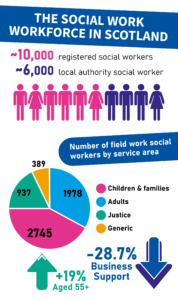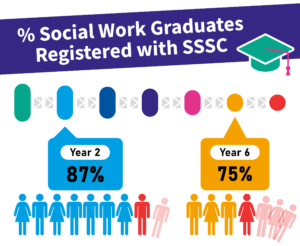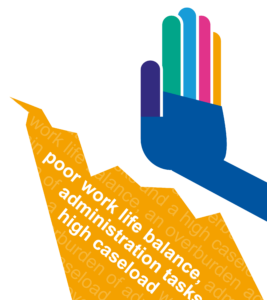Social Work Scotland Briefing: 1 June 2022
Workforce and workforce planning
Over the last few years, Social Work Scotland’s members have been reporting increasing concerns that social work workloads have become unmanageable, and that social workers in local authorities and health and social care partnerships are struggling under the weight of their caseloads.
This led us to ask: can our workforce realistically work with people in the way that they’re trained to do, and in line with the aims of Scotland’s legislation and policy? How much work is too much for social workers? Where’s the line?
The picture that emerges from the ‘Setting the Bar’ research is serious, and demands attention now. It describes an ageing workforce – some 19% are reaching retirement age – and a staff group who are struggling with administrative burdens, fearful of making mistakes, and living with the moral distress of having to work in a way which doesn’t align with their professional values. One in 4 social workers graduating doesn’t make it to 6 years in the job.


Setting the Bar gives us some evidence to say what ‘enough’ is. We know from the research that Chief Social Work Officers and social workers agree on what constitutes an indicative maximum caseload, and we can use this to help us inform workforce planning for the medium to long term.
Having indicative maximum caseloads can also help empower social work leaders set a bar, and establish a line beyond which we know social work no longer supports people as it’s supposed to. That line can help better articulate the conditions and workforce necessary to do what social work is entrusted and required to do. We need social workers using their skills in the right places; Setting the Bar’s 1,588 respondents (just over 25% of the social workers employed by Scottish local authorities) overwhelmingly talked of frustration that their time is consumed by administrative tasks, which have fallen to them as budget cuts have done away with business support staff and other key roles.

As The Promise, recommendations for the National Care Service and a proposed National Social Work Agency are under discussion, we want to inform conversations, and illustrate the ‘implementation gap’ between the policy aims of the Scottish Government and the reality of people’s experiences. There are opportunities to make the changes needed, but we need to act now; we’re at a crucial tipping point.
If we are to address the current challenges faced by social work, we must be bold. Articulating an indicative maximum caseload for social workers is no different than specifying classroom numbers for teachers. We all know that not every class is the same, but we also understand that teachers can only do their job well if they have the time and opportunity to do so.
The push and pull of social work
Setting The Bar asked respondents about reasons for leaving or staying in the profession, and it is clear from the results that whilst people felt pushed out by factors such as a poor work life balance, an overburden of administration tasks and a high caseload, they also felt a strong pull to stay through relationships with colleagues, making a difference in people’s lives and social work’s values.


These testimonies demonstrate clear links in how people’s professional values are frustrated but holding them in the job; commitment to the work, and the people it supports, runs like a thread throughout social workers’ contributions to Setting the Bar. Operational (team) leaders and senior social workers were also felt to be positive influences in this regard. For Social Work Scotland, as a leadership organisation for social workers, this articulates the positive effect of strong relationships and professional oversight, bringing social work values across the profession; and the impact that has. We know from our Chief Social Work Officer survey that there’s a mirrored perspective from leaders in the profession, who feel that their responsibilities as a public sector manager sometimes sits in tension with their professional social work identity.
The need to shift public perceptions of social work, and to build a stronger social work voice, are further common themes across the feedback from leaders and frontline social work. It’s evident from the research that people feel strongly that social work, undertaken in communities and with good relationships, can and should make a difference in people’s lives, but that the profession must be better supported and resourced to do so.
We know that much of the current policy and legislation being developed for Scotland’s communities aligns with social work’s fundamental approach: empowering individuals to find what works for them, using trauma-informed practice, de-stigmatising mental health and advocating for human rights are at the core of social work.
However, since the 1968 Social Work (Scotland) Act, there has been an overwhelming tide of legislation and policy which directly affects social work; and social workers at all levels are frustrated at the focus on the responsibility often placed on individuals to just ‘make it work’. There is insufficient understanding among those drafting and setting policy that the social work profession cannot simply do more and more indefinitely. We are at a tipping point, on the other side of which individuals and communities will be put at risk.
We’re at a critical point; we can’t afford to lose more social workers, and we must better support the workforce we have. From students and newly qualified practitioners to those experienced social work managers, leaders and para-professionals who provide support to those on the frontline. For this we will need to expand the profession’s capacity to build relationships with people requiring support or protection, and reinforce professional leadership roles at all levels.
What’s getting in the way?
When properly resourced, social workers can directly improve the experience and wellbeing of individuals and families and communities, nurturing strengths and giving meaning to human rights. Such preventative action also has the bonus of helping to reduce or defer the need for more costly action at a later stage. Austerity measures, and cuts to back office and administrative services which support social workers, have had a huge impact on the way that social work professionals can support people. They’ve also contributed significantly to the rise in caseloads. Many respondents to Setting the Bar contributed thoughtful and telling examples which demonstrated that there are real tensions between what we’re asking professionals to do, and the resources we’re asking them to do it with. Holding rising caseloads, in a system which pushes social workers to operate in ways inconsistent with their professional values and judgement, has caused many of the respondents to Setting the Bar to experience ‘moral distress’. They came into the profession to empower and enable people, but are often only able to prevent further deterioration in someone’s situation; no one wins in such an environment.
It’s striking that the ‘moral distress’ described by frontline social workers is echoed so strongly by Scotland’s Chief Social Work Officers. In our annual CSWO survey respondents report that they are spending an ever greater proportion of time on inspection and audits. They also have concerns about reconciling the need for significant budget savings with continued delivery of safe, accessible-to-all services, in line with social work’s professional values.
We can’t ignore the issues around recruitment either. Social work is a professional role, requiring specific training and qualification. While the demands on the profession have only grown over recent years, the overall size of the profession has not. That has created serious difficulties in recruiting, leaving social work teams carrying vacancies for long periods, teams having to work with a deficit in their numbers, the remaining social workers holding additional cases, and the managers in the unenviable position of trying to “do more with less”. Setting the Bar supports the position that Scotland needs to train and employ more social workers, provide better support throughout professional careers, and enable social workers to have a stronger voice at all levels of the systems they work in.
There are opportunities in a National Care Service, implementation of The Promise and Community Justice to really strengthen the profession, reinforcing social work’s values and unique contribution, from Chief Social Work Officers through to the social workers and para-professionals and administrative workers in frontline teams. However, these same drivers risk further fragmenting the profession; we see real value for individuals and communities in maintaining social work as a holistic profession and service, with all its parts connected under a shared professional leadership. As we engage in discussion about the future of Scotland’s public services, the fundamental questions must always be: “will this change make it easier or harder for the people working in the system to achieve positive outcomes alongside people in their communities?” and “will this change progress or impede social justice in Scotland, in terms of poverty and inequality, discrimination and isolation, the environment and human rights?”
What can we do?
One such action is building agreement about the number of social workers Scotland needs to do its work (as set out in law, and our knowledge of the approaches which deliver positive change). We’re working with the Scottish Government to develop national indicators to evidence system demand and workforce supply requirements. This includes being clear that social work is distinct from, but closely bound up with, social care. Investment in both of these workforces is needed, enabling individuals to fulfil their unique roles to the highest standards.
In both social work and social care, clear pathways for career progression, support and recognition are also important. We’re working with the Office of the Chief Social Work Advisor and other partners in helping to develop ways for social workers to flourish as their experience grows. The reach of the workforce into community-based and preventative practice is crucial.
We were heartened to see social work’s values articulated so strongly throughout survey respondents’ contributions to Setting the Bar, and we’re actively developing a number of projects which will help strengthen social work’s voice, with other professionals and the public. For example, Social Work Scotland directly supports and funds evidence-based reframing work focussed on changing perception of care experience, and are developing a project looking at how we can better articulate the social justice impact of social work.
The role of our networks and membership has never been so important. Social Work Scotland provide national opportunities for engagement and representation: through our standing committees and subgroups, members are regularly consulted by the Scottish Parliament, national partners and other agencies, as well as input to key consultations, and a range of events, seminars and our national conference – each offers an opportunity to shape the future of social work.



















